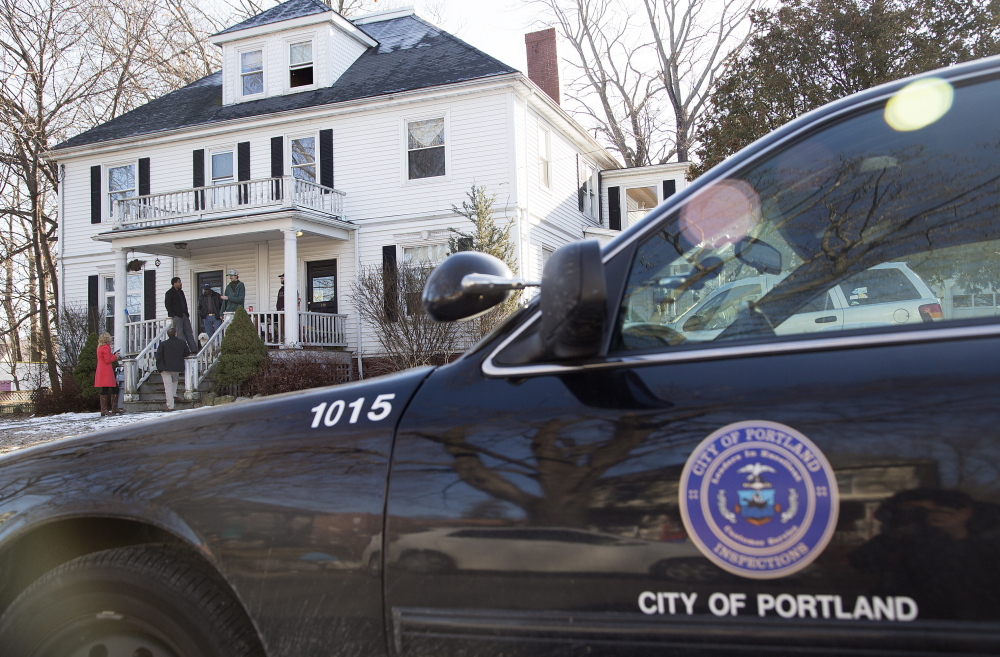A task force formed after a deadly fire on Noyes Street last month is expected to recommend the creation of a new city department with a staff to oversee safety in the city’s thousands of rental units
The group may also require landlords to register with the city, hire their own property inspectors, and provide proof that their buildings comply with the city’s fire and building codes, as well as making more information about the safety of rental housing available to residents online.
“I think we have agreement on the big stuff,” said Julie Sullivan, the city’s public health director, who is staffing the task force.
The city is looking to improve its inspection program following the fire that tore through a two-apartment building on Noyes Street on Nov. 1, killing six young people. It was the deadliest fire in Maine in 40 years.
The property at 20-24 Noyes St. had a history of complaints, including improper storage of combustible materials and possibly an illegal unit on the third floor. Sworn statements included in a civil lawsuit filed against the landlord suggest the building may not have had working smoke alarms at the time of the fire.
An investigation into the cause, and whether landlord Gregory Nisbet broke any city codes, is ongoing.
On Monday, code and fire inspectors responded to complaints at 188 Dartmouth St., which is also owned by Nisbet and is currently in foreclosure.
The inspection revealed 10 violations, according to records released by the city on Wednesday. These included improper storage of combustible materials, illegal locks on an exit door, a lack of fire protection on an old boiler and electrical issues. Since the house appeared to have been functioning as a boarding home, Nisbet will be required to install an alarm system.
The draft recommendations for improving the city’s inspections program emerged Wednesday at the task force’s third meeting and will be finalized in the coming weeks before being vetted by representatives of area landlords and tenants.
Task force members agreed Wednesday that there should be a separate housing inspections division responsible for conducting both building and fire inspections, rather than having separate inspectors for each set of codes. Housing inspectors would be cross-trained in both codes and have the legal authority to issue citations when they find violations.
Acting City Manager Sheila Hill-Christian said the current system is inefficient, because citations can’t be issued without her approval.
“It seems like it should not have to come to the city manager to cite,” Hill-Christian said. “There should be a process that allows for a quicker, lower-level decision-making process.”
The number of additional staff members needed to deal with housing inspections and complaints was not finalized Wednesday. But Inspections Director Tammy Munson said Boston, with 650,000 residents, has a staff of 23 people to oversee housing. Based on population, Munson said three housing inspectors would be needed in Portland.
The task force concluded that having city staff conduct proactive inspections of 17,000 rental properties would require too many resources to be feasible. But to move toward that goal, the city may begin requiring enforcing an existing code requiring landlords to register at City Hall and hire their own certified inspector to ensure their buildings are up to code. Landlords would have to submit a report of compliance to the city every two to three years.
Neighborhood Prosecutor Rich Bianculli said the city could then devote its resources to unresponsive landlords and buildings that do not meet codes. The city needs to establish fines significant enough to ensure landlords comply with the rules, he said.
“You have to force people to register and provide that information,” Bianculli said. “When people start getting pegged, word travels fast.”
In January, the city plans to roll out a new system that would allow residents to lodge housing complaints anonymously through their cell phones or desktop computers.
The group also wants to create a centralized database to track housing complaints and inspections. That database would allow the city create a risk assessment of each property based on its age, construction type and inspections history.
While the task force will likely make recommendations concerning enforcement, it is also focusing on education of tenants and landlords. The group supported leaving the education component to firefighters, but expanding their outreach from elementary schools to include high schools and colleges.
Deputy Fire Chief Keith Gautreau said college students especially need to be taught about the importance of maintaining working smoke detectors.
“We historically have never gone on campus to do fire safety stuff,” he said. “Education is going to be the way we reach them, not with proactive inspections.”
The task force will begin the second phase of its work Jan. 5, when members representing landlords, tenants and the Portland Housing Authority join the group. A public hearing is expected to be held in early February and a final report of recommendations is expected to be presented to the City Council’s Public Safety Health and Human Services by mid-February.
Send questions/comments to the editors.



